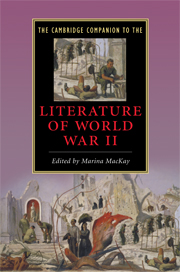12 - Women writers and the war
from Part III - Approaches and revisions
Published online by Cambridge University Press: 28 May 2009
Summary
“Women writers and the war” is a misleadingly straightforward title for a subject of enormous proportions, a subject that potentially embraces not only the geographical extent of a world war, but also a series of theoretical questions about writing and subjectivity, conflict and creativity. Although, as earlier chapters show, women of all nationalities responded powerfully to the events in Europe and beyond, this chapter will focus on British women's responses to the conflict. The selection is not intended to suggest that British women writers can somehow stand for all women writers and their responses to war; rather it is an attempt, through selection, to indicate the complexity of the topic. Even within the confines of a small island (albeit one with a large empire attached), women responded to the war with breathtaking diversity, their writing articulating everything from anger to grief, from resentment to support. Some even avoided the conflict, relocating their fiction in imaginative spaces beyond the reach of the war machine. Yet these spaces nonetheless bore the imprint of the conditions of their construction, and can be seen as one strategy among many for imaginatively surviving war. This chapter will examine the diverse strategies of British women writers to ask a series of larger questions about war and gender, and to consider whether it is possible to identify a coherent body of writing that represents a female response to the Second World War.
- Type
- Chapter
- Information
- The Cambridge Companion to the Literature of World War II , pp. 165 - 178Publisher: Cambridge University PressPrint publication year: 2009
- 2
- Cited by

